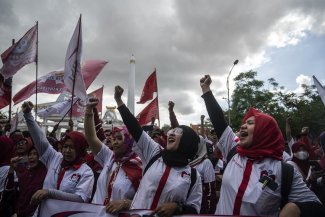
In the late 1960s and early 1970s, massive change was taking place all over Europe and beyond. The French students’ revolt and general strike of 1968 remain most vivid in popular memory but were set against the backdrop of widespread social upheaval. In the early 1960s, European countries were still overshadowed by the legacy of World War II. Ageing leaders like Charles De Gaulle and Konrad Adenauer presided over old-fashioned, hierarchical and authoritarian political structures.
Yet students in Paris demanded political liberation, educational reform and more sexual freedom. The brutal police response helped to provoke a general strike and factory occupations involving millions of workers.
France was not the only country in the grip of change, and 1968 played out in different ways according to national circumstances. In Germany, Rudi Dutschke became the spokesman for the student movement demanding an end to the war in Vietnam, to know the truth about the country’s Nazi past and the liberation of society in general. In Italy, 1968 protests reflected dissatisfaction with the corrupt ruling Christian Democrat elite. In the Eastern Bloc, Czechoslovakia’s Prague Spring gained mass public support and brought short-lived liberalisation.
In Spain, students in Madrid demonstrated against the fascist Franco regime, demanding democracy, trade union and workers’ rights and educational reform. In Portugal too, popular protests helped to oust dictator Antonio Salazar from office, while in the United Kingdom, the baby-boomers in ‘Swinging London’ rejected wartime frugality and aspired to more personal freedom.
Everyday life during this period was deeply politicised. To be called ‘qualunquista’ (‘politically indifferent’) in Italy was an insult.
The 1968ers questioned fundamental values in a world of technological change, consumerism and the ‘throwaway-society’. They sought the broad devolution of decision-making, with committees covering every walk of life conducting endless debates in search of consensus.
The women’s movement grew as feminists demanded liberation, equal rights and respect. Overall, it was a time of unprecedented optimism and a belief that society was capable of radical change towards peace, freedom and tolerance, mirrored in the ‘flower power’ movement in the United States.
Yet 1968 was followed in many countries by the tightening of repression. Germany’s 1968 Emergency Acts (’Notstandsgesetze’) provoked fierce opposition from trade unions and the student movement. In Portugal, following widespread election fraud in 1969, the regime once again resorted to authoritarianism, arresting and exiling opponents and closing down trade unions and student associations, until the revolution of 1974. NATO’s covert post-war ‘Operation Gladio’ and the CIA’s involvement in weakening trade union organisation and influencing elections in Italy were kept secret until 1990. Later, in the 1970s and 1980s, Margaret Thatcher set out to systematically destroy the trade union movement in Britain.
The shock of 1968 prompted Europe’s ruling class to develop a more sophisticated and determined strategy to maintain its power and wealth, reflected in the clamp-down on trade unions, student movements and left-wing organisations. Whereas those endless debates also led to conflicting demands and an increasingly fragmented political left.
As a result, frustration and disillusionment gradually metamorphosed into more violent and isolated protests. In Italy, the post-1968 decade became known as the anni di piombo (years of lead) as the Brigate Rosse took up arms against the establishment, while in Germany the Baader-Meinhof gang adopted similarly brutal and pitiless methods.
What relevance today?
It is easy to underestimate the impact of the events of 1968 and their aftermath. Certainly, disillusionment grew amongst a generation that believed in revolution, coupled with cynicism about traditional party politics. Some changed tactics: for example, Daniel Cohn-Bendit – Danny the Red – a rebel leader in Paris, went on to embrace the EU establishment, as a Green rather than socialist MEP.
But despite the setbacks, Europeans have created a more liberal and tolerant society, ending the stiff conformity of the post-war era.
In 1969, when Willy Brandt became Germany’s first social democratic Chancellor since 1930, he launched a programme of reforms with the words: "Wir wollen mehr Demokratie wagen" (“Let’s dare more democracy”). They included stronger workers’ rights and the birth of the apprentice movement. Brandt’s overtures towards East Germany would eventually culminate in the reunification of the country after the fall of the Berlin Wall. In Italy, post-1968, popular pressure led to the referendums legalising divorce and eventually abortion.
Participatory democracy has left a legacy in many areas of civil society and lives on the work of a wide range of NGOs, grassroots and self-help organisations.
The women’s movement has transformed opportunities for half the population. From demands for equal rights, economic independence and sexual freedom, embodied in the availability of the contraceptive pill, women have gone on to challenge the gender pay gap, the glass ceiling, domestic violence and sexual abuse.
But overall, it is impossible to imagine a revival of the energy, and indeed idealism, of the sixties. The young demonstrators of 1968 failed to get the society they hoped for, and that spirit has now been channelled elsewhere. People in Europe still take to the streets to oppose war, express their concern about climate change, demand respect for women or LGBTI people or defend their pensions. Protest movements focus on specific demands or interests rather than changing society.
The trade union movement has been weakened by the actions of right-wing governments, supported by big business and the media, who learned the lessons of 1968 and were determined to undermine workers’ ability to act in solidarity.
Today, some EU governments are trying to lead their people back towards authoritarianism and intolerance. In France, the trade union movement is smaller in numbers and divided into several organisations, yet retains considerable influence and its capacity for mobilisation through industrial action, and in Nordic countries unions are recognised as vital social partners. Trade unions do have the potential to be influential policy-makers and game-changers.
Trade unions have to reform themselves further to become more inclusive and to encourage the participation of women, young people (in particular in the digital economy) and workers from ethnic minorities. They fight for the humanisation of the world of labour through better work-life balance and health and safety, and take on broader social issues such as environmental protection and LGBTI workers’ rights.
However, questions remain about how to engage and inspire people (especially young people) in the context of changing work organisation (precarious contracts, platform and freelance work) and continuing attacks on trade unions.
The freedoms we have today should not be undervalued, and without 1968 they would not exist. But if they are to be preserved, trade unions must continue to act to defend and extend the rights of workers, and to build alliances wherever possible with like-minded political and societal movements, including NGOs, civic initiatives and religious organisations.








